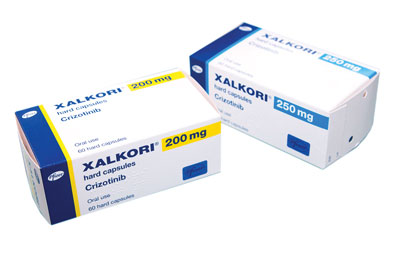Copiktra (duvelisib) vs Xalkori (crizotinib)
Copiktra (duvelisib) vs Xalkori (crizotinib)
Copiktra (duvelisib) is a dual inhibitor of phosphoinositide 3-kinase (PI3K)-delta and PI3K-gamma, indicated for the treatment of adult patients with relapsed or refractory chronic lymphocytic leukemia/small lymphocytic lymphoma (CLL/SLL) and follicular lymphoma. Xalkori (crizotinib), on the other hand, is an ALK (anaplastic lymphoma kinase) and ROS1 (c-ros oncogene 1) inhibitor, primarily used for the treatment of certain types of non-small cell lung cancer (NSCLC) that are ALK or ROS1-positive. The choice between these two medications would depend on the specific type of cancer a patient has, as they are targeted therapies designed for different molecular abnormalities and cancer types.
Difference between Copiktra and Xalkori
| Metric | Copiktra (duvelisib) | Xalkori (crizotinib) |
|---|---|---|
| Generic name | Duvelisib | Crizotinib |
| Indications | Chronic lymphocytic leukemia (CLL), small lymphocytic lymphoma (SLL), and follicular lymphoma (FL) | Non-small cell lung cancer (NSCLC) with specific genetic alterations (ALK or ROS1-positive) |
| Mechanism of action | PI3K inhibitor, targeting PI3K-delta and PI3K-gamma | ALK and MET tyrosine kinase inhibitor |
| Brand names | Copiktra | Xalkori |
| Administrative route | Oral | Oral |
| Side effects | Diarrhea, neutropenia, rash, fatigue, pyrexia, cough, nausea, upper respiratory infection, pneumonia, musculoskeletal pain | Visual disturbances, gastrointestinal effects, edema, elevated transaminases, fatigue, decreased appetite, upper respiratory infection, dizziness, neuropathy |
| Contraindications | History of severe allergic reactions to duvelisib or any of its components | Concurrent use with strong CYP3A inhibitors or inducers, history of severe hypersensitivity to crizotinib |
| Drug class | Antineoplastic, PI3K inhibitor | Antineoplastic, tyrosine kinase inhibitor |
| Manufacturer | Verastem, Inc. | Pfizer Inc. |
Efficacy
Copiktra (Duvelisib) Efficacy in Treating Lymphoma
Copiktra (duvelisib) is a kinase inhibitor specifically approved for the treatment of adult patients with relapsed or refractory chronic lymphocytic leukemia (CLL)/small lymphocytic lymphoma (SLL) after at least two prior therapies. The efficacy of Copiktra in lymphoma, particularly in follicular lymphoma (FL), was also evaluated in a subset of patients within clinical trials. In these studies, Copiktra has shown efficacy in inducing partial or complete responses in a significant proportion of patients with relapsed or refractory FL, a type of non-Hodgkin lymphoma. The response rates observed in clinical trials support its use in patients who have exhausted other treatment options.
However, it is important to note that the safety and efficacy of Copiktra for other types of lymphoma outside of CLL/SLL and FL have not been established. The use of Copiktra in lymphomas other than the ones specified may be considered off-label and should be evaluated carefully against potential risks. Clinical trials and case studies may provide insights into its efficacy in other lymphoma subtypes, but such use would require careful clinical judgment and consideration of the individual patient's condition.
Xalkori (Crizotinib) Efficacy in Treating Lymphoma
Xalkori (crizotinib) is primarily known as a treatment for non-small cell lung cancer (NSCLC) that is anaplastic lymphoma kinase (ALK)-positive. However, its efficacy in lymphoma is less established. There has been interest in exploring the use of crizotinib in ALK-positive lymphomas, given its mechanism of action as an ALK inhibitor. Some case reports and small studies suggest that ALK-positive lymphoma patients might benefit from crizotinib, especially in cases where the disease is refractory to conventional chemotherapy.
Despite these preliminary findings, the use of Xalkori in the treatment of lymphoma remains investigational and is not approved by regulatory agencies for this indication. Further clinical trials are necessary to establish the safety and efficacy of crizotinib in the treatment of ALK-positive lymphomas. Until such data is available, the use of Xalkori in lymphoma should be considered experimental and undertaken within the context of clinical research or as a part of a comprehensive treatment plan considering all available evidence and treatment options.
Regulatory Agency Approvals
Copiktra
-
European Medical Agency (EMA), European Union

-
Food and Drug Administration (FDA), USA

Xalkori
-
European Medical Agency (EMA), European Union

-
Food and Drug Administration (FDA), USA

-
Health Canada

-
Pharmaceuticals and Medical Devices Agency (PMDA), Japan

-
Therapeutic Goods Administration (TGA), Australia

Access Copiktra or Xalkori today
If Copiktra or Xalkori are not approved or available in your country (e.g. due to supply issues), you can access them via Everyone.org.
How it works

Make an enquiry
Choose the medicine you want to buy, answer a couple of questions, and upload your prescription to speed things up. We’ll get back to you within 24 hours.


Make an enquiry
Choose the medicine you want to buy, answer a couple of questions, and upload your prescription to speed things up. We’ll get back to you within 24 hours.


Breeze through the paperwork
We'll guide you through the required documents for importing unapproved medicine, ensuring you have all the necessary information.


Get a personalized quote
We’ll prepare a quote for you, including medicine costs and any shipping, administrative, or import fees that may apply.


Receive your medicine
Accept the quote and we’ll handle the rest - sourcing and safely delivering your medicine.

Some text on this page has been automatically generated. Speak to your physician before you start a new treatment or medication.
Let's talk
If you have any questions, call us or send us a message through WhatsApp or email:
Contact us




